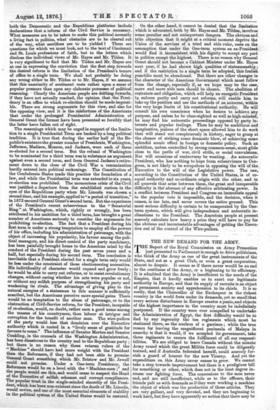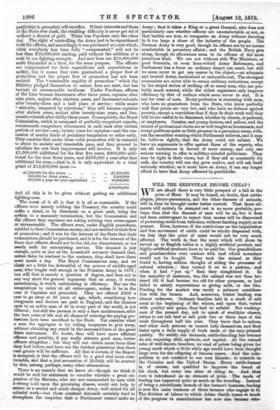THE NEW DEMAND FOR THE ARMY. T HE Report of the
Royal Commission on Army Promotion just presented to Parliament is enough to drive politicians, who think of the Army as one of the great instruments of the State, and not as a great Club, or even a great corporation, almost to despair. It seems as if there never would be an end to the costliness of the Army, or a beginning to its efficiency. It is admitted that the Army is insufficient to the needs of the Empire, that it hardly enables us to exert our legitimate authority in Europe, and that its supply of recruits is an object of permanent anxiety and apprehension to its chiefs. It is so costly, that the Chancellor of the Exchequer in the richest country in the world frets under its demands, yet so small that every serious disturbance in Europe creates a panic, and objects of the highest importance to the country must be indefinitely postponed. If the country were ever compelled to undertake the Administration of Egypt, the first difficulty would be to find by any ingenuity the ten regiments which must be stationed there, as the nucleus of a garrison ; while the true reason for leaving the magnificent peninsula of Malaya in anarchy is that it would, if we accepted its government, take three regiments to ensure the fulfilment of all our responsi; bilities. We are obliged to leave Canada without the minute Army round which the great Militia force could be diligently trained, and if Australia federated herself, could scarcely fur- nish a guard of honour for the new Viceroy. And yet the expenditure on this Army never ceases to grow. We cannot take a step towards improvement but there is a prodigious bill for something or other, which does not in the least degree in- crease our fighting force. The concessions to the men never end, and are still insufficient, while as to the. officers, their friends pelt us with demands as if they were working a machine the object of which was the production of those articles. .They are very gallant, and very devoted, and they are beginning to work hard, but they have apparently no notion that there may be patriatisin in pecuniary self-sacrifice. If their interests and those of the State ever clash, the resulting difficulty is never got rid of without a shower of gold. There was Purchase only the other day. The right of controlling the Army had to be repurchased frail the officers, and accordingly it was purchased at a cost which, when everybody has been fully "compensated," will not be les§ than £10,000,000 sterling, paid without the addition of a min to our fighting strength. And now here are £19,900,000 more demanded at a blow, for the same purpose. The officers are compensated for their expenditure and expectations in money, but it seems they were guaranteed a proper flow of proMotion, and the proper flow of promotion has not been secured. The "reasonable rapidity of promotion" which the Ministry pledged themselves to ensure does not exist, but has become ah unreasonable tardiness. Under Purchase, officers of the Line became lieutenants after three years, captains after nine years, majors after nineteen years, and lieutenant-colonels after twenty-three and a half years of service ; while under "seniority, tempered by rejections," they will become captains after sixteen years, majors after twenty-nine years, and lieu- tenant-colonels after thirty-three years. Consequently, the Royal Commission, which is composed of perfectly competent experts, recommends compulsory retirements in each rank after certain periods of service—say, twenty years for captains—and the con- cession of sundry kinds of pecuniary temptation to retire early. They consider that under these rules promotion will be restored to about its ancient and reasonable pace, and they proceed to calculate the cost their improvement will involve. It is only £1,500,000 additional for the first five years, £800,000 addi- tional for the next three years, and £350,000 a year after that additional for ever,—that is, it is only equivalent to a total grant of £19,900,000 more :— £1,500,000 for flvo years ...
... £7,500,000 800,000 for three years... ... ... 2,400,000 850,000 a year for ever eapitalised 10,000,000
£19,900,000
And all this is to be given without getting an additional fighting-man.
The worst of it all is that it is all so reasonable. If the officers were merely robbing the Treasury, the country could make a stand, or by dismissals on a great scale bring the syStem to a summary termination, but the Commission and the officers they represent are asking nothing very extravagant or unreasonable. The officers were, under English precedents, entitled to their Commission-money, and are entitled to their flow of promotion ; and it was for the interest of the State that their commissions should be purchased, and it is for the interest of the State that officers should not be too old, too discontented, or too nearly unfit for enterprising service. The demand is just enough, quite as just as the household servants' demand that, unless there be contract to the contrary, they shall have three meat meals a day. The Royal Commissions may, and we thin* are a little too distrustful of the powers of middle-aged men;.who fought well enough in the Prussian Army in 1872; but still that is merely a question of degree, and does not in any waY-meet the general argument that an army, if worth maintaining, is worth maintaining in efficiency. Nor are the temptations to retire at all extravagant, unless it be in the case of Captains not promoted. They are offered £200 a year to go away at 40 years of age, which, considering how clergymen and doctors are paid in England, and the chances open to an active man of 40 in every part of the world, is not illiberal ; but still the pension is only a bare maintenance, after the best years of life and all chance of entering the paying pro- fessions have been sacrificed to the State. Yet consider what a sum the aggregate is for toiling taxpayers to give away, without obtaining any result in the increased force of the great State instrument. No doubt, they will have more efficient effioers. and possibly, if pay really attracts good men, better officers altogether ; but they will not obtain more force than they had before, and have not the feeblest guarantee that these vast grants will be sufficient. All that is certain, if the Report is acoepted, is that the officers will be a good deal more com- fortable, and that a just accusation of ill-faith will be averted by this, among, perhaps, many other alternatives.
There is no remedy that we know of—though we think it would be well for statesmen to consider whether a great ex- pansion of the Marines, who are not commanded by men with a strong hold upon the governing classes, would not help to sectire us a second and much cheaper Army, well suited for all colonial work—but these constant demands certainly tend to strengthen the suspicion that a Parliament cannot make an Army ; that it takes a Sing or a great General, who does not particularly care whether officers are uncomfortable or not, so that battles are won, to reorganise an Army without devoting to it too large a share of the industry of the people. The German Army is very good, though its officers are by no means comfortable in pecuniary affairs ; and the British Navy gets along, though its allowances seem to its officers of the most penurious kind. We are not without able War Ministers, or good Generals, or even keen-witted Army Reformers, and Parliament has a force no ordinary despot can exert, but still we seem never to get any nearer to the object,—an adequate and trusted Army, maintained at endurable cost. The strongest economists are never able to secure military reductions, except by the stupid device of striking off so many men, who are pro- bably much wanted, while the ablest organisers only improve efficiency by dint of outlays which seem never to end. It is not for want of men. Every profession is swarming with men, who have no guarantees from the State, who know perfectly well that prizes are very few, and who have no defence against poverty, except a conviction that if they do their work well they will be too useful to be dismissed, whether by clients, or patients, or employers. Curates, and young doctors, and sailors, and the armies of professional clerks are as well taught as lieutenants, and accept positions quite as little pleasant in a pecuniary sense, with- out the securities wanting which Parliament believes, and it may be, believes rightly, that the Army could not subsist. We have no arguments to offer against those of the experts, who are all unanimous in favour of more money, and only one serious warning to offer to military-minded politicians. They may be right in their views, but if they ask so constantly for cash, the country will one day grow restive, and will ask itself seriously whether, as it must have an Army, it can any longer afford to have that Army officered by gentlefolks.































 Previous page
Previous page